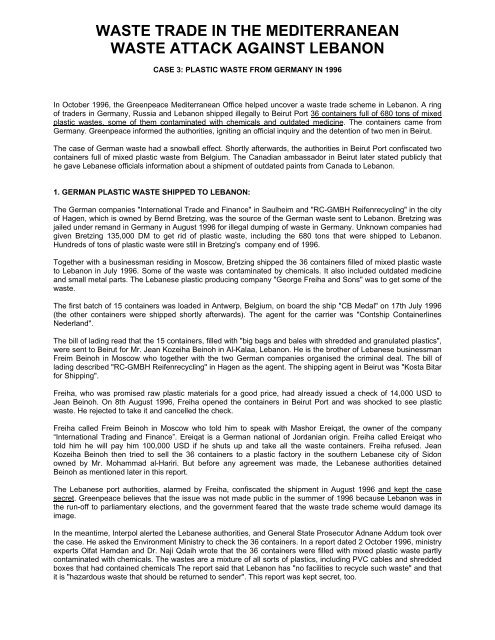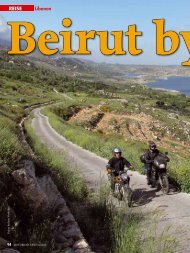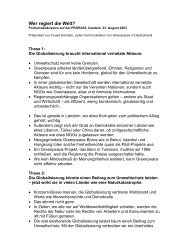WASTE TRADE IN THE MEDITERRANEAN ... - Fouad Hamdan
WASTE TRADE IN THE MEDITERRANEAN ... - Fouad Hamdan
WASTE TRADE IN THE MEDITERRANEAN ... - Fouad Hamdan
You also want an ePaper? Increase the reach of your titles
YUMPU automatically turns print PDFs into web optimized ePapers that Google loves.
<strong>WASTE</strong> <strong>TRADE</strong> <strong>IN</strong> <strong>THE</strong> <strong>MEDITERRANEAN</strong><br />
<strong>WASTE</strong> ATTACK AGA<strong>IN</strong>ST LEBANON<br />
CASE 3: PLASTIC <strong>WASTE</strong> FROM GERMANY <strong>IN</strong> 1996<br />
In October 1996, the Greenpeace Mediterranean Office helped uncover a waste trade scheme in Lebanon. A ring<br />
of traders in Germany, Russia and Lebanon shipped illegally to Beirut Port 36 containers full of 680 tons of mixed<br />
plastic wastes, some of them contaminated with chemicals and outdated medicine. The containers came from<br />
Germany. Greenpeace informed the authorities, igniting an official inquiry and the detention of two men in Beirut.<br />
The case of German waste had a snowball effect. Shortly afterwards, the authorities in Beirut Port confiscated two<br />
containers full of mixed plastic waste from Belgium. The Canadian ambassador in Beirut later stated publicly that<br />
he gave Lebanese officials information about a shipment of outdated paints from Canada to Lebanon.<br />
1. GERMAN PLASTIC <strong>WASTE</strong> SHIPPED TO LEBANON:<br />
The German companies "International Trade and Finance" in Saulheim and "RC-GMBH Reifenrecycling" in the city<br />
of Hagen, which is owned by Bernd Bretzing, was the source of the German waste sent to Lebanon. Bretzing was<br />
jailed under remand in Germany in August 1996 for illegal dumping of waste in Germany. Unknown companies had<br />
given Bretzing 135,000 DM to get rid of plastic waste, including the 680 tons that were shipped to Lebanon.<br />
Hundreds of tons of plastic waste were still in Bretzing's company end of 1996.<br />
Together with a businessman residing in Moscow, Bretzing shipped the 36 containers filled of mixed plastic waste<br />
to Lebanon in July 1996. Some of the waste was contaminated by chemicals. It also included outdated medicine<br />
and small metal parts. The Lebanese plastic producing company "George Freiha and Sons" was to get some of the<br />
waste.<br />
The first batch of 15 containers was loaded in Antwerp, Belgium, on board the ship "CB Medal" on 17th July 1996<br />
(the other containers were shipped shortly afterwards). The agent for the carrier was "Contship Containerlines<br />
Nederland".<br />
The bill of lading read that the 15 containers, filled with "big bags and bales with shredded and granulated plastics",<br />
were sent to Beirut for Mr. Jean Kozeiha Beinoh in Al-Kalaa, Lebanon. He is the brother of Lebanese businessman<br />
Freim Beinoh in Moscow who together with the two German companies organised the criminal deal. The bill of<br />
lading described "RC-GMBH Reifenrecycling" in Hagen as the agent. The shipping agent in Beirut was "Kosta Bitar<br />
for Shipping".<br />
Freiha, who was promised raw plastic materials for a good price, had already issued a check of 14,000 USD to<br />
Jean Beinoh. On 8th August 1996, Freiha opened the containers in Beirut Port and was shocked to see plastic<br />
waste. He rejected to take it and cancelled the check.<br />
Freiha called Freim Beinoh in Moscow who told him to speak with Mashor Ereiqat, the owner of the company<br />
“International Trading and Finance”. Ereiqat is a German national of Jordanian origin. Freiha called Ereiqat who<br />
told him he will pay him 100,000 USD if he shuts up and take all the waste containers. Freiha refused. Jean<br />
Kozeiha Beinoh then tried to sell the 36 containers to a plastic factory in the southern Lebanese city of Sidon<br />
owned by Mr. Mohammad al-Hariri. But before any agreement was made, the Lebanese authorities detained<br />
Beinoh as mentioned later in this report.<br />
The Lebanese port authorities, alarmed by Freiha, confiscated the shipment in August 1996 and kept the case<br />
secret. Greenpeace believes that the issue was not made public in the summer of 1996 because Lebanon was in<br />
the run-off to parliamentary elections, and the government feared that the waste trade scheme would damage its<br />
image.<br />
In the meantime, Interpol alerted the Lebanese authorities, and General State Prosecutor Adnane Addum took over<br />
the case. He asked the Environment Ministry to check the 36 containers. In a report dated 2 October 1996, ministry<br />
experts Olfat <strong>Hamdan</strong> and Dr. Naji Qdaih wrote that the 36 containers were filled with mixed plastic waste partly<br />
contaminated with chemicals. The wastes are a mixture of all sorts of plastics, including PVC cables and shredded<br />
boxes that had contained chemicals The report said that Lebanon has "no facilities to recycle such waste" and that<br />
it is "hazardous waste that should be returned to sender". This report was kept secret, too.
2. GREENPEACE HELPS UNCOVER <strong>THE</strong> SCANDAL:<br />
In late October 1996, Greenpeace received information about this waste trade scheme, and alarmed high-ranking<br />
politicians. Greenpeace urged them to make the issue public and to demand that Germany takes back the<br />
containers. Days later, State Prosecutor Addum went public with the case and started interrogating all involved<br />
persons in Lebanon. German embassy officials were invited to the Justice Palace and to the Foreign Ministry, and<br />
they were officially asked to return the waste.<br />
The Lebanese authorities arrested in November 1996 Jean Kozeiha Beinoh and Mikhail Andraos, who accused of<br />
helping Beinoh sell the waste. Andraos told justice officials that he was offered 2,500 dollars if the waste was sold.<br />
Greenpeace gathered information about the waste traders in Germany and found out that German national<br />
Bretzing was in 1993 the director of the German company “Asian Trade Import Export”. This company was<br />
responsible for dumping 6,000 tons of used tires from Germany in the Baltic state of Estonia in the early 1990s.<br />
They were burnt illegally and emitted poisonous smoke. Bretzing was jailed on remand in Germany in August 1996<br />
under suspicion of illegally storing hazardous waste.<br />
Mashoor Ereiqat claimed that he was fooled by Bretzing. But Greenpeace has a document in which Ereiqat clearly<br />
described the contents of the containers as "mixed plastics" and "plastic waste".<br />
In April 1997, a Lebanese court released Jean Kozeiha Beinoh and Mikhail Andraos, arguing that they did not know<br />
that the 36 containers were full of plastic waste. The court decided to jail Freim Kozeiha Beinoh 10 years in<br />
absence and fine him one million Lebanese pounds (about 650 dollars). Freim Kozeiha Beinoh believed to be living<br />
in Russia.<br />
3. GREENPEACE PROVES THAT EXPORT OF <strong>WASTE</strong> WAS ILLEGAL:<br />
The export operation of the 36 containers from Germany to Lebanon was illegal under the Basel Convention<br />
because it took place without the consent of the Lebanese authorities. Moreover, it was a fraudulent operation<br />
because the hazardous waste does not conform with the material declared officially in the bill of lading. This was<br />
proven by an expertise carried out by the Hamburg-based Oekopol Institute for Greenpeace. The expertise focused<br />
on the classification of the waste in the framework of the German legislation, European Union (EU) laws and the<br />
Basel Convention.<br />
Treatment of waste inside Germany is the first option of waste disposal under Article 3 of the German law on<br />
shipments of waste. The second priority is treatment in another EU country. "Disposal outside the EU can only be<br />
the last option when treatment inside Germany or the EU is impossible. 21 containers are clearly hazardous waste<br />
under the German legislation. This means that their export to Lebanon is illegal under article 1.1b of the Basel<br />
Convention," the expertise said.<br />
Due to strong indications that the German waste was shipped to Lebanon for final disposal, "this waste export is<br />
prohibited by the EU Council regulation on the supervision and control of shipments of waste (EEC Nr. 259/93,<br />
Article 14)". "Even if the wastes shipped to Beirut would be considered as wastes for recovery, they would by no<br />
means fall into the Green List of Wastes (Annex II to EEC 259/93) because of their contamination," the expertise<br />
added.<br />
Greenpeace provided copies of the expertise to the Lebanese judicial authorities and to the Environment Ministry<br />
to support them in their work to return the wastes to Germany. Copies were also given to the German authorities in<br />
Bonn and Baden-Wuerttemberg and to the German embassy in Beirut. Greenpeace was in regular contact with the<br />
authorities in Bonn and in Stuttgart, the capital of the state of Baden-Wuerttemberg from which the waste<br />
originated.<br />
4. GERMAN EXPERTS AND GREENPEACE <strong>IN</strong>SPECT <strong>THE</strong> CONTA<strong>IN</strong>ERS:<br />
On November 1996, three German experts inspected the containers at Beirut Port. Lebanese officials and<br />
Greenpeace were present at the site and documented the inspection. The Germans experts told Greenpeace that<br />
they will write in their report that all the waste should be returned to Germany.<br />
Some of the German plastic wastes carried the logo of Henkel, car parts manufacturer VDO, Chemson Polymer<br />
Additive, Brockhues Farben, Roehrig Granit and Neopol Waschmittel fuer Industrielle Verschmutzungen.<br />
The names of the German experts are:<br />
- Klaus Roescheisen: Director (Ministrial Dirigent, Abteilungsleiter Grundsatzangelegenheiten, Verkehr, Oekologie<br />
und Abfallwirtschaft) at the Ministry of Environment of the state of Baden-Wuerttemberg<br />
2
- Hans Ernst Kunz: Head of a Project Group (Projektgruppe Sonderabfallentsorgung), at the Ministry of<br />
Environment in Baden-Wuerttemberg (Kerneplatz 9, 70182 Stuttgart, T ++49-711-1262675, F -1262881)<br />
- Paul Wiennand: Scientific assistant at the “Research Institute Plastic Recycling” (Wissenschaftlicher Assistent,<br />
Forschungsinstitut Kunstoffrecycling) in the town of Willich. (Siemensring 79, 47853 Willich, T ++49-2154-428824,<br />
F 428823, Private: ++49-2156-2866.)<br />
During the inspection, Greenpeace pressed Germany to take back from Lebanon all the 36 containers. No<br />
distinction should be made between contaminated and not contaminated wastes.<br />
5. LEBANESE ENVIRONMENT M<strong>IN</strong>ISTER LOSES JOB OVER SCANDAL:<br />
Environment Minister Pierre Pharaon issued a "certification" on 23 July 1996 in which he wrote that the Ministry of<br />
Environment has "no objection" about imported plastic waste being used in the industrial process of the Lebanese<br />
factory "Rocky pour le Commerce et L'industrie" in Blat-Jbeil.<br />
Pharaon wrote a letter to the Higher Coucil of Customs saying that factory owner Robert Khoury wanted to use<br />
plastic waste, described in French as "Rognures et debris de matieres plastiques". But Mr. Isam Hobballah, the<br />
head of the Higher Council for Customs, answered on 4 July 1996 rejecting this.<br />
The way Mr. Pharaon dealt with this issue and with past waste trade schemes made him lose his job during a<br />
government reshuffle in November 1996. It was not clear whether the company in Blat-Jbeil had also tried to<br />
purchase the plastic waste from Germany or from another foreign source.<br />
6. CHRONOLOGY OF EVENTS:<br />
30 October 1996: Greenpeace calls on the German government to return the 36 containers full of contaminated<br />
plastic waste from Lebanon. Germany has a moral and legal responsibility to return the waste.<br />
6 November 1996 - Greenpeace charged that German authorities in Bonn are dragging their feet and downplaying<br />
the issue of the 36 containers. Greenpeace also called on German officials in the Environment Ministry and in the<br />
Foreign Ministry in Bonn not to waste time and return the waste swiftly. It is unacceptable that German officials are<br />
claiming that there is no evidence that the containers are full of unsorted plastic waste partly contaminated by<br />
chemicals. And they are insinuating that they would return only the contaminated waste.<br />
13 November 1996 - The German waste trade scheme was an illegal operation under German and European<br />
Union (EU) laws, a Greenpeace expertise said.<br />
27 November 1996 - Greenpeace called on Germany to take back from Lebanon all the 36 containers. No<br />
distinction should be made between contaminates and not contaminated waste. The call came as three German<br />
scientific and legal experts inspected the containers at Beirut Port. Lebanese officials and Greenpeace were<br />
present at the site and documented the inspection. Officials in Germany refused to clearly state that they would<br />
return all the waste and insinuated that they might return only the contaminated wastes. This is unacceptable and<br />
outrageous.<br />
7 February 1997 - Greenpeace said that “technical and bureaucratic” measures are delaying a decision to finance<br />
the shipments of German plastic waste back from Beirut to Germany. A official from the Environment Ministry in<br />
Bonn told Greenpeace that the German state of Baden-Wuerttemberg has informed the ministry that the 36<br />
containers with plastic waste in Beirut should be returned, and that the financing should be done by Germany’s<br />
"Solidarity Fund for Re-Exporting Waste". However, the authorities in Baden-Wuerttemberg have failed to inform<br />
Bonn about the quantity of the waste, the costs of the re-export operation and what will happen to the waste in<br />
Germany.<br />
12 February 1997 - Greenpeace welcomed the decision of the Lebanese Ministry of Environment to adopt a new<br />
regulation that bans the import of all hazardous waste into Lebanon. The ministerial decision bans all waste imports<br />
for final disposal or for incineration and all hazardous waste imports bound for recycling. Wastes imported for final<br />
disposal disguised as "for recovery" (that is incineration) will also be outlawed. Greenpeace has provided ministry<br />
officials with documents to help them draft the strict regulation.<br />
The Lebanese authorities had been ignoring the issue of toxic waste trade for years. They had banned<br />
Greenpeace ships from visiting Lebanon in 1995 and 1996 to prevent the organisation from working on this issue.<br />
The Greenpeace Mediterranean Office has been campaigning in Lebanon against waste imports since 1994 when<br />
it exposed that toxic waste imported from Italy in 1987 was still dumped in many areas.<br />
3
28 February 1997 - Greenpeace welcomes the decision of Germany’s “Solidarity Fund for Re-Exporting Waste” to<br />
finance the shipment of the 36 containers back to Germany.<br />
19 May 1997 - Greenpeace congratulated Germany for taking back a first batch of 36 containers full of plastic<br />
waste partly contaminated with chemicals and outdated medicine. 21 containers were shipped to the German port<br />
town of Bremerhaven. The other 15 containers will be returned to Germany about 14 days later on board the<br />
Belgian vessel “Kerstin”. On that day, Lebanon sent a clear warning to all waste traders world-wide. It is telling<br />
them that any waste entering Lebanon will be returned to sender at the expenses of the exporting company or<br />
government.<br />
2 June 1997 - The second and last batch of the 36 containers was loaded into the ship “MF Levant”. The vessel<br />
with 15 containers on board left to Egypt and from there the waste was to be sent on another boat to the German<br />
port town of Bremerhaven.<br />
24 June 1997 - The Greenpeace ship today Albatros "welcomed" in the German port of Bremerhaven the batch of<br />
21 containers. The crew held a banner saying in English and Arabic "Welcome back - Stop Waste Trade" near the<br />
ship Nuova Mediterranea which transported the containers. The remaining 15 containers full of plastic waste<br />
arrived in Hamburg shortly afterwards.<br />
<strong>Fouad</strong> <strong>Hamdan</strong><br />
Greenpeace Mediterranean<br />
Lebanon Campaign<br />
Beirut, August 1997<br />
4




